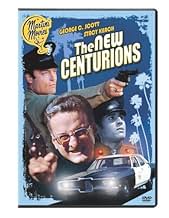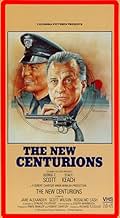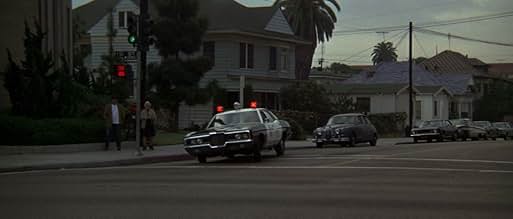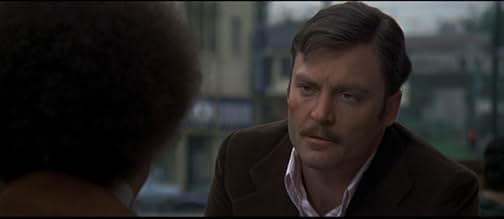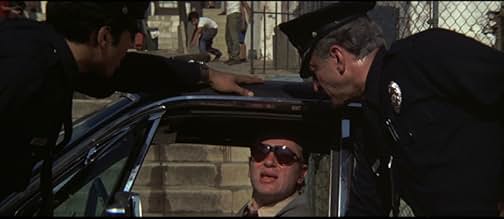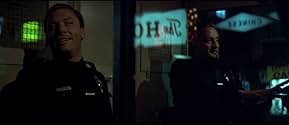CALIFICACIÓN DE IMDb
7.0/10
3.7 k
TU CALIFICACIÓN
Agrega una trama en tu idiomaFamily man Roy Fehler joins the L.A.P.D. to make ends meet while finishing law school and is indoctrinated by seasoned veteran Kilvinski. As time goes on, Roy loses his ambitions and family ... Leer todoFamily man Roy Fehler joins the L.A.P.D. to make ends meet while finishing law school and is indoctrinated by seasoned veteran Kilvinski. As time goes on, Roy loses his ambitions and family as police work becomes his entire life.Family man Roy Fehler joins the L.A.P.D. to make ends meet while finishing law school and is indoctrinated by seasoned veteran Kilvinski. As time goes on, Roy loses his ambitions and family as police work becomes his entire life.
- Dirección
- Guionistas
- Elenco
Richard E. Kalk
- Milton
- (as Richard Kalk)
Peter De Anda
- Gladstone
- (as Peter DeAnda)
- Dirección
- Guionistas
- Todo el elenco y el equipo
- Producción, taquilla y más en IMDbPro
Opiniones destacadas
Joseph Wambaugh had a string of best-selling novels in the 1970's, all based on his experiences as a beat cop in the Los Angeles Police Department. 'The New Centurions' was one such novel, and this is the film of the book. Wambaugh's familiar world of drunks, domestic disputes, whores and 'busting fruits' is set out here with reasonable exactitude. Sterling ('Towering Inferno') Silliphant's screenplay is somewhat sluggish, but the Wambaugh ambience is immediately recognizable.
The point of the film is that yes, police work is physically dangerous, but the real threat to the officers' well-being comes from the emotional strain that they have to endure. Marriages founder and strong, healthy men take to drink and drugs because they get worn down by seeing what crime does to people. Often, they find their training and knowledge of the law completely useless, because the reality of street life makes glorified social workers of them. Some officers acquire a benign wisdom which enables them to bend the rules and do a little good. The esprit de corps among the officers is strong, and deep personal friendships are forged, but the job is an ugly, dirty, dangerous one and society is fortunate that there are some people willing to do it.
The friendship between rookie Roy Fehler (Stacey Keach) and veteran Andy Kilvinski (George C. Scott) is the centrepiece of the story. The younger man learns and grows under the tutelage of a partner who is an outstanding cop. We see Fehler in his turn become a veteran, but we also watch the decline of both men as the job grinds them down.
Intimate moments of unspoken affection between the two men are well done, and the Californian paradise which houses this human hell is nicely depicted, but would a senior police officer really beat up a rapacious landlord in the street? And after the innovative "Boston Strangler" of four years earlier, it is a shame to see this able director cranking out a film so devoid of artistic merit.
"I tried to hold on," says Fehler after being dragged along by a car. It's a metaphor for his police career.
The point of the film is that yes, police work is physically dangerous, but the real threat to the officers' well-being comes from the emotional strain that they have to endure. Marriages founder and strong, healthy men take to drink and drugs because they get worn down by seeing what crime does to people. Often, they find their training and knowledge of the law completely useless, because the reality of street life makes glorified social workers of them. Some officers acquire a benign wisdom which enables them to bend the rules and do a little good. The esprit de corps among the officers is strong, and deep personal friendships are forged, but the job is an ugly, dirty, dangerous one and society is fortunate that there are some people willing to do it.
The friendship between rookie Roy Fehler (Stacey Keach) and veteran Andy Kilvinski (George C. Scott) is the centrepiece of the story. The younger man learns and grows under the tutelage of a partner who is an outstanding cop. We see Fehler in his turn become a veteran, but we also watch the decline of both men as the job grinds them down.
Intimate moments of unspoken affection between the two men are well done, and the Californian paradise which houses this human hell is nicely depicted, but would a senior police officer really beat up a rapacious landlord in the street? And after the innovative "Boston Strangler" of four years earlier, it is a shame to see this able director cranking out a film so devoid of artistic merit.
"I tried to hold on," says Fehler after being dragged along by a car. It's a metaphor for his police career.
"The New Centurions" should have a solid 8.5 rating, rather than just a 7. This is an under- rated film about the general lives of police officers from a Los Angeles Precinct. George C. Scott and Stacy Keach lead the way as two police officers who are initially teamed up for night duty around Los Angeles. Following a few incidents, they get re-assigned different partners until Stacy Keach is transfered to the vice squad and George C. Scott retires from the force. The film wisely avoids any kind of trendy or glamorous approach to Police work. It is just shown for what it is - a dirty job that someone has to do. The police officers aren't shown to be more heroic than the average person but dedicated and good at their jobs. There is some good action along the way but "The New Centurions" works due to the acting, writing and direction. The recent British DVD release has brilliant sound and picture quality.
George C. Scott is a cool, uniformed policeman who employs his own unique methods of dealing with petty crime once again, it's the character who knows his beat and knows how to keep it under control
Faced with the task of rounding up prostitutes in the local Red Light district, Scott is well aware that dragging them into court will result only in nominal fines and a great deal of wasted time So he packs them into a patrol wagon and drives them around the streets for the rest of the night, thus losing them a night's earnings and at the same time keeping the streets reasonably tidy...
Scott isn't in the least vindictive; he is merely keeping the peace in accordance with his own law He even takes the trouble to stop the truck and buy them a bottle of Whisky with which to while the night away
Yet this cop is a fast man with a gun He is also the kind of policeman who is capable of administering a beating to the wrongdoers
Faced with the task of rounding up prostitutes in the local Red Light district, Scott is well aware that dragging them into court will result only in nominal fines and a great deal of wasted time So he packs them into a patrol wagon and drives them around the streets for the rest of the night, thus losing them a night's earnings and at the same time keeping the streets reasonably tidy...
Scott isn't in the least vindictive; he is merely keeping the peace in accordance with his own law He even takes the trouble to stop the truck and buy them a bottle of Whisky with which to while the night away
Yet this cop is a fast man with a gun He is also the kind of policeman who is capable of administering a beating to the wrongdoers
Roy Fehler (Stacy Keach), Gus Plebesly (Scott Wilson), and Sergio Duran (Erik Estrada) are rookie police patrolmen. Roy hopes to become a lawyer and his police work inevitably causes friction with his wife Dorothy (Jane Alexander). He's paired with experienced cop Andy Kilvinski (George C. Scott) who expounds his Kilvinski's Law on the tough streets of LA. Gus is by-the-book with 3 kids. He's paired with Whitey (Clifton James) and accidentally kills an unarmed man.
This is episodic in nature and is more TV than cinema. It fits a lot better as an ongoing TV show. It has a fun early moment of a fake impromptu divorce of a battling drunken couple. It's sardonic and crass. George C. Scott is operating at the top of his game. His performance fills his scenes. This would work better as a movie if it has a definitive central case or villain or incident. This is the opposite of slick. I can certainly see many later TV cop shows using this movie as a template.
This is episodic in nature and is more TV than cinema. It fits a lot better as an ongoing TV show. It has a fun early moment of a fake impromptu divorce of a battling drunken couple. It's sardonic and crass. George C. Scott is operating at the top of his game. His performance fills his scenes. This would work better as a movie if it has a definitive central case or villain or incident. This is the opposite of slick. I can certainly see many later TV cop shows using this movie as a template.
Stacy Keach and George C. Scott star in this very gritty, very honest portrayal of early-70s police life. It's directed by Richard Fleischer, who usually worked on much flashier material than this. I've seen a lot of films that dug in and tried to paint a clear image of police life, but this story brings a level of realism that is somewhat missing in most cases - it was written by a cop (Joseph Wambaugh).
"The New Centurions" is a title that hints at a much deeper perspective into familiar territory. Even though all the suspected clichés are still somewhat in place, they're there out of reality rather than just filling space in a movie plot. George C. Scott's character is on his way to retirement, but instead of him not making it, he takes a much darker path. It's that darker path, and the sense of hope behind it, that informs both Scott and Keach in their fantastic performances. They're as good as they'd ever been here - deep, powerful, and incredibly personal. There's a real emotional vulnerability on display that can't be denied.
"The New Centurions" is a title that hints at a much deeper perspective into familiar territory. Even though all the suspected clichés are still somewhat in place, they're there out of reality rather than just filling space in a movie plot. George C. Scott's character is on his way to retirement, but instead of him not making it, he takes a much darker path. It's that darker path, and the sense of hope behind it, that informs both Scott and Keach in their fantastic performances. They're as good as they'd ever been here - deep, powerful, and incredibly personal. There's a real emotional vulnerability on display that can't be denied.
¿Sabías que…?
- TriviaAccording to Ed Lauter, the casting director refused to see him for the role of Galloway. Lauter made a plea to George C. Scott, who then demanded that Lauter be cast.
- ErroresBoth Fahler and Kilvinski make a grievous error (not to mention violating both LAPD policy and procedure) by not handcuffing the truck driver when they arrest him. That is the first thing that should have been done before placing him in the back seat of the patrol car, especially given his belligerence about being pulled over and issued a traffic ticket, which then he refused to sign.
- ConexionesFeatured in Los Angeles Plays Itself (2003)
Selecciones populares
Inicia sesión para calificar y agrega a la lista de videos para obtener recomendaciones personalizadas
- How long is The New Centurions?Con tecnología de Alexa
Detalles
- Fecha de lanzamiento
- País de origen
- Sitio oficial
- Idiomas
- También se conoce como
- Polizeirevier Los Angeles-Ost
- Locaciones de filmación
- Burbank, California, Estados Unidos(St. Joseph's Hospital)
- Productoras
- Ver más créditos de la compañía en IMDbPro
Contribuir a esta página
Sugiere una edición o agrega el contenido que falta

Principales brechas de datos
By what name was The New Centurions (1972) officially released in India in English?
Responda

